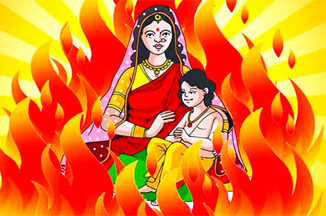
THE SUPREME PERSON
Creation is like a tree created by the powers of Maya
The Supreme Lord said: They speak of the eternal banyan tree that has its origin above in the Supreme Being (ParBrahm) and its branches below in the cosmos, and whose leaves are the Vedic hymns. One who understands this tree is a knower of the Vedas. (See also 10.08) (15.01) The branches of this cosmic tree of Maya (Illusion) spread all over the cosmos. The tree is nourished by three modes (Gunas) of material Nature (Prakriti); sense pleasures are its sprouts; and its roots of ego and desires stretch below in the human world, causing Karmic bondage. (15.02)
How to cut the tree of attachment and attain salvation by taking refuge in God
The real form of this tree is not perceptible here on earth, nor is its beginning, end, or existence. Having cut the firm roots — the desires — of this tree by the mighty ax of Self-knowledge and detachment; thus thinking: “I take refuse in that very primal person from which this primal manifestation comes forth”, seek that supreme abode from where one does not come back (to the mortal world) again.
(15.03-04) The wise reach that eternal goal, who are free from pride and delusion, who have conquered the evil of attachment, who constantly dwell in the Supreme Self with all lust (Kaam) completely stilled, and who are free from dualities of pleasure and pain. (15.05) The sun does not illumine there, nor the moon, nor the fire. That is My supreme abode. Having reached there people do not come back (to the temporal world). (See also 13.17 and 15.12) (15.06)
The embodied soul is the enjoyer
The eternal individual soul (Jeevaatma) in the body of living beings is, indeed, My integral part. It associates with the six sensory faculties of perception — including the mind — and activates them. (15.07) Just as the air takes aroma away from the flower; similarly, the individual soul (Jeevaatma) takes the six sensory faculties from the physical body it casts off during death to the new physical body it acquires in reincarnation (by the power of Karm).
(See also 2.13) (15.08) The living entity (Jeev) enjoys sense pleasures using six sensory faculties of hearing, touch, sight, taste, smell, and mind. The ignorant cannot perceive Jeev departing from the body, nor staying in the body and enjoying sense pleasures by associating with the modes of material Nature. But those who have the eye of Self-knowledge can see it. (15.09-10) The yogis, striving for perfection, behold the living entity (Jeev) abiding in their inner psyche (as consciousness), but the ignorant and those whose inner psyche is not pure; even though striving, do not perceive Him. (15.11)
Spirit is the essence of everything
Know the light energy to be Mine that comes from the sun and illumines the whole world, and is in the moon and in fire. (See also 13.17 and 15.06) (15.12) Entering the earth, I support all beings with My energy. Becoming the sap-giving moon, I nourish all the plants. (15.13) Becoming the digestive fire, I remain in the body of all living beings. Uniting with vital life forces (Praan and Apaan), I digest all types of food.
(15.14) And I am seated in the inner psyche of all beings. Memory, Self-knowledge, and removal of doubts and wrong notions (about the Eternal Being by reasoning, or in trance (Samaadhi)) come from Me. I am, in truth, that which is to be known by the study of all the Vedas. I am, indeed, the author of the Vedant and the knower of the Vedas. (See also 6.39) (15.15)
What are the supreme spirit, spirit and the individual soul?
There are two entities (Purushas) in the cosmos: The changeable or temporal Divine Beings (Kshar Purush), and the unchangeable Eternal Being (Brahm, Akshar Purush). All created beings are subject to change, but the Eternal Being does not change. (15.16) There is another Supreme Personality of the Godhead (beyond both the temporal and the eternal) called the Absolute Reality or Paramaatma, who sustains both the temporal and the eternal (Kshar and Akshar) by pervading all three planetary spheres (Lokas) as the eternal Lord (Ishvar).
(15.17) Because I am beyond both the temporal (Kshar) and the eternal (Akshar); therefore, I am known in this world and in the Veda as the Supreme Being (ParBrahm, Paramaatma, Purushottam, the Absolute, Truth, Sat, Supersoul, etc.). (15.18) The wise, who truly understand Me as the Supreme Being (Purushottam), know everything and worship Me wholeheartedly, O Arjun. (See also 7.14, 14.26, and 18.66) (15.19) Thus, I have explained this most secret science of Self-knowledge (Taaratamya-vidyaa, Brahm-vidyaa) , O sinless Arjun. Having understood this, one becomes enlightened, and one’s all duties are accomplished, O Arjun. (15.20)
DIVINE AND DEMONIC QUALITIES
A list of major divine qualities that should be cultivated for salvation
The Supreme Lord said: Fearlessness, purity of the inner psyche, perseverance in the yog of Self-knowledge, charity, sense-restraint, sacrifice, study of the scriptures, austerity, honesty; nonviolence, truthfulness, absence of anger, renunciation, calmness, abstinence from malicious talk, compassion for all creatures, freedom from greed, gentleness, modesty, absence of fickleness, splendor, forgiveness, fortitude, cleanliness, absence of malice, and absence of pride — these are the (twenty-six) qualities of those endowed with divine virtues, O Arjun. (16.01-03)
A list of demonic qualities that should be given up before spiritual journey can begin
O Arjun, the marks of those who are born with demonic qualities are: Hypocrisy, arrogance, pride, anger, harshness, and ignorance. (16.04) Divine qualities lead to salvation (Moksh); the demonic qualities are said to be for bondage. Do not grieve, O Arjun, you are born with divine qualities. (16.05)
There are only two types of human beings, the wise and the ignorant
Basically, there are only two types or castes of human beings in this world: The divine, and the demonic. The divine has been described at length. Now hear from Me about the demonic, O Arjun. (16.06) Persons of demonic nature do not know what to do and what not to do. They have neither purity nor good conduct nor truthfulness. (16.07) They say that the world is unreal, without a substratum, without a God, and without an order.
The world is caused by sexual union of man and woman alone and nothing else. (16.08) Adhering to this wrong, atheistic view, these degraded souls — with small intellect and cruel deeds — are born as enemies for the destruction of the world. (16.09) Filled with insatiable desires, hypocrisy, pride, and arrogance; holding wrong views due to delusion; they act with impure motives. (16.10) Obsessed with endless anxiety lasting until death, considering sense gratification their highest aim, and convinced that sense pleasure is everything; (16.11) Bound by hundreds of ties of desire and enslaved by lust and anger, they strive to obtain wealth by unlawful means to fulfill sensual pleasures.
They think: (16.12) This has been gained by me today; I shall fulfill this desire; I have this much wealth and will have more wealth in the future; (16.13) that enemy has been slain by me, and I shall slay others also. I am the lord. I am the enjoyer. I am successful, powerful, and happy; (16.14).I am rich and born in a noble family. Who is equal to me? I shall perform sacrifice, I shall give charity, and I shall rejoice.
Thus deluded by ignorance, (16.15) bewildered by many fancies, entangled in the net of delusion, addicted to the enjoyment of sensual pleasures, they fall into a foul hell. (16.16) Self-conceited, stubborn, filled with pride and intoxication of wealth, they perform sacrifice (charity,Yajn) only in name, for show, and not according to scriptural injunction. (16.17) These malicious people cling to egoism, power, arrogance, lust, and anger; and hate Me who dwells in their own bodies and those of others. (16.18)
Suffering is the destiny of the ignorant
I hurl these haters, cruel, sinful, and mean people into the cycles of rebirth in the womb of demons again and again. (16.19) O Arjun, entering the wombs of demons, birth after birth, the deluded ones sink to the lowest hell without ever attaining Me. (16.20)
Lust, anger, and greed are the three gates to hell
Lust, anger, and greed are the three gates of hell leading to the downfall (or bondage) of the individual. Therefore, one must (learn to) give up these three. (16.21) One who is liberated from these three gates of hell, O Arjun, does what is best and consequently attains the supreme abode. (16.22)





Be the first to comment